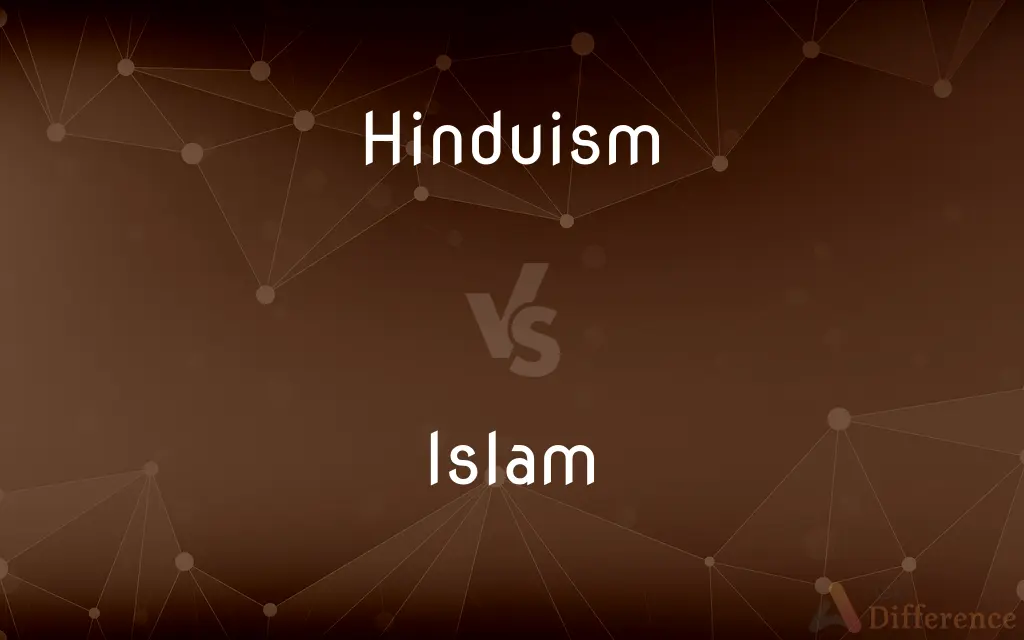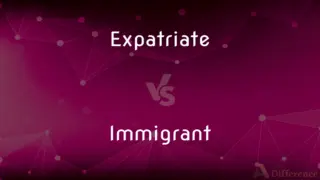Hinduism vs. Islam — What's the Difference?
By Tayyaba Rehman — Updated on September 23, 2023
Hinduism is a polytheistic religion originating in India, emphasizing karma and dharma, while Islam is a monotheistic Abrahamic religion founded on the teachings of the Prophet Muhammad in the Quran.

Difference Between Hinduism and Islam
Table of Contents
ADVERTISEMENT
Key Differences
Hinduism and Islam are two of the world's major religions, both with distinct traditions and beliefs. Hinduism, primarily found in India and Nepal, encompasses a vast array of practices, rituals, and philosophies. Islam, on the other hand, is founded on the teachings of the Prophet Muhammad and is prevalent in parts of Asia, Africa, and other regions.
In terms of beliefs, Hinduism is notably diverse, with no single founder or scripture universally accepted by all adherents. Islam, in contrast, emphasizes the Quran as its holy text, with followers, or Muslims, adhering to its teachings and those of Prophet Muhammad. Hinduism celebrates a multitude of deities within its pantheon, while Islam strictly believes in monotheism, with Allah being the sole deity.
Sacred spaces in Hinduism include temples dedicated to various deities and pilgrimage sites across India. For Islam, mosques serve as places of worship, and the Hajj pilgrimage to Mecca is one of its Five Pillars. Rituals in Hinduism vary widely and include ceremonies, festivals, and daily practices. In Islam, practices such as daily prayers (Salah), fasting during Ramadan, and almsgiving (Zakat) are fundamental.
Though Hinduism and Islam have distinct beliefs and practices, they share some universal values like compassion, righteousness, and the importance of community. Interactions over centuries have also led to shared cultural and historical experiences in many regions.
Comparison Chart
Foundational Texts
Various including Vedas, Upanishads
Quran
ADVERTISEMENT
Core Belief
Diverse with multiple deities
Monotheism (belief in one God, Allah)
Origin
Indian subcontinent
Arabian Peninsula
Major Rituals
Pujas, festivals, yagnas
Five Pillars: Salah, Zakat, Hajj, Fasting, Shahada
Concept of Life After Death
Reincarnation based on karma
Resurrection and judgment leading to Heaven or Hell
Compare with Definitions
Hinduism
A major world religion originating in the Indian subcontinent.
Hinduism has a rich tapestry of myths and legends.
Islam
A monotheistic Abrahamic religion founded on the teachings of Prophet Muhammad.
Islam's followers are called Muslims.
Hinduism
Follows the caste system and rituals like puja.
Hinduism has deep-rooted traditions that influence daily life.
Islam
Follows the Quran as its central religious text.
The Quran in Islam is considered the word of God.
Hinduism
Encompasses diverse beliefs, practices, and deities.
Hinduism celebrates festivals dedicated to various gods and goddesses.
Islam
Stresses the importance of community, or Ummah.
The sense of Ummah in Islam fosters a strong bond among Muslims.
Hinduism
Emphasizes the concepts of karma, dharma, and moksha.
In Hinduism, good deeds in this life can lead to a better next life.
Islam
Believes in prophets like Adam, Abraham, Moses, Jesus, and Muhammad.
In Islam, Muhammad is the last of the prophets.
Hinduism
Includes sacred scriptures like the Vedas and the Bhagavad Gita.
Many teachings of Hinduism are derived from ancient scriptures.
Islam
Islam (; Arabic: اَلْإِسْلَامُ, romanized: al-’Islām, [ɪsˈlaːm] (listen) "submission [to God]") is an Abrahamic monotheistic religion teaching that Muhammad is a messenger of God. It is the world's second-largest religion with 1.9 billion followers, or 24.9% of the world's population, known as Muslims.
Hinduism
Hinduism () is an Indian religion and dharma, or way of life. It is the world's third-largest religion, with over 1.2 billion followers, or 15–16% of the global population, known as Hindus.
Islam
A monotheistic religion characterized by the doctrine of absolute submission to God and by reverence for Muhammad as the chief and last prophet of God.
Hinduism
A major religious and cultural tradition of South Asia, which developed from Vedic religion.
Islam
The people or nations that practice Islam; the Muslim world.
Hinduism
A religious, philosophical, and cultural tradition that developed in India with the composition of the Vedas, characterized by belief in a supreme being of many forms and natures, by the view that opposing theories are aspects of one eternal truth, by the desire for liberation from earthly evils, and by belief in reincarnation.
Islam
The civilization developed by the Muslim world.
Hinduism
The dominant religion of India; characterized by a caste system anud belief in reincarnation.
Islam
The religion of the Mohammedans; Mohammedanism; Islamism. Their formula of faith is: There is no God but Allah, and Mohammed is his prophet.
Hinduism
A complex of beliefs and values and customs including worship of many gods, especially the Trimurti composed of Brahma the Creator; Vishnu the preserver; and Shiva the destroyer.
Islam
The whole body of Mohammedans, or the countries which they occupy.
Hinduism
The predominant religion of India; characterized by a caste system and belief in reincarnation
Islam
The religion of Muslims collectively which governs their civilization and way of life; the predominant religion of northern Africa, the Middle East, Pakistan and Indonesia
Hinduism
A body of religious and philosophical beliefs and cultural practices native to India and characterized by a belief in reincarnation and a supreme beingof many forms and natures, by the view that opposing theories are aspects of one eternal truth, and by a desire for liberation from earthly evils
Islam
The monotheistic religion of Muslims founded in Arabia in the 7th century and based on the teachings of Muhammad as laid down in the Koran;
The term Muhammadanism is offensive to Muslims who believe that Allah, not Muhammad, founded their religion
Islam
Emphasizes the Five Pillars as core practices.
Daily prayers are a significant aspect of Islam.
Common Curiosities
Is Hinduism monotheistic or polytheistic?
Hinduism is generally considered polytheistic, though it has monotheistic elements.
What is the central tenet of Islam?
Monotheism, the belief in one God, Allah.
What is the primary scripture of Hinduism?
Various scriptures like Vedas and Upanishads, with no single universally accepted text.
Where did Hinduism originate?
In the Indian subcontinent.
What is the holy book of Islam?
The Quran.
What is the Hindu concept of the afterlife?
Reincarnation based on karma.
Who is the founder of Islam?
Prophet Muhammad.
How is morality viewed in Hinduism?
Through the lens of dharma, or righteous duty.
What is the concept of God in Hinduism?
There are multiple deities, each representing various aspects of the divine.
What is the significance of the Ganges in Hinduism?
It's considered a sacred river and is associated with purification.
How often do Muslims pray?
Five times a day, as one of the Five Pillars of Islam.
What is the significance of the Hajj in Islam?
It's a mandatory pilgrimage to Mecca and one of the Five Pillars of Islam.
Are there dietary restrictions in these religions?
Yes, Hinduism often emphasizes vegetarianism while Islam has halal dietary laws.
Do Muslims believe in an afterlife?
Yes, they believe in resurrection, judgment, and Heaven or Hell.
What is the holiest city in Islam?
Mecca, in Saudi Arabia.
Share Your Discovery

Previous Comparison
AM vs. FM
Next Comparison
Expatriate vs. ImmigrantAuthor Spotlight
Written by
Tayyaba RehmanTayyaba Rehman is a distinguished writer, currently serving as a primary contributor to askdifference.com. As a researcher in semantics and etymology, Tayyaba's passion for the complexity of languages and their distinctions has found a perfect home on the platform. Tayyaba delves into the intricacies of language, distinguishing between commonly confused words and phrases, thereby providing clarity for readers worldwide.













































